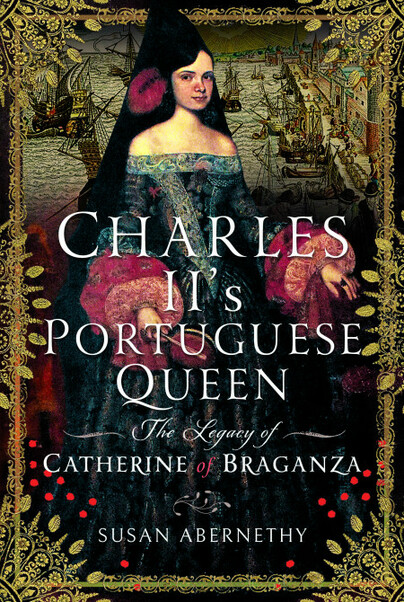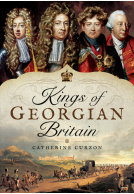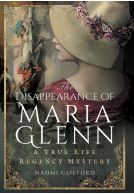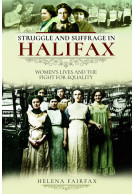Charles II’s Portuguese Queen (Hardback)
The Legacy of Catherine of Braganza
Imprint: Pen & Sword History
Pages: 248
Illustrations: 16 mono illustrations
ISBN: 9781036121648
Published: 30th April 2025
(click here for international delivery rates)
Need a currency converter? Check XE.com for live rates
Catherine of Braganza has regularly been referred to as ‘the forgotten queen’ and there is much truth in this statement. Following her death in 1705, a fully detailed biography in English remained unwritten until 1915. The last major bio published about her was in Portuguese in 1941 and it has never been translated into English. Despite her sheltered and religious upbringing, she made a spectacular marriage that was plagued by the infidelities of her husbands. Readers can readily find published biographies of Charles II’s many glamourous mistresses, but curiously, little on his wife. This new work presents more comprehensive information on Catherine’s life in Portugal than previous biographies and integrates new scholarship regarding Catherine’s practice of queenship and patronage of Catholic Baroque culture in an effort to carve out a prominent role at the Stuart court and to compete with her rivals. Readers familiar with Catherine’s story may learn some delightful new details about her life.
Catherine has never been forgotten in Portugal. She considered herself Portuguese at heart and during her reign as Queen of England, she persistently looked out for Portuguese interests. In her own words, she considered her marriage a personal sacrifice to what was best for her home country. She is one of the few dowager queens in history to return to her homeland where she acted as regent for her brother.
This biography places Catherine within the context of the history of Portugal and their seaborne empire, and the strong political and commercial ties between England and Portugal dating to the mid-fourteenth century which played a key role in the culmination of the Marriage Treaty of 1661. Her legacy lives on in her dowry, specifically the port of Bombay which allowed England to become a global empire, introducing many everyday items into European culture.
Rating: 5 out of 5 stars
NetGalley, Anita Wallas
What an amazing story. As always, the role of a Queen is largely ignored in a male dominated world. In the case of Catherine, she had nothing going for her, being female and foreign. Charles’ life is well documented, but little mention is made if Catherine. His mistresses and indulgences receive more attention. Susan Abernathy has done a remarkable job in putting all of this to rights with this account of a truly remarkable lady.
I knew little about her, but recall a reference to her in Pepys diary where he commented that her hair was strangely arranged and her clothing was unusual. And that she brought tea, which he believed woukd never catch on. It’s difficult to imagine how she must have felt, arriving in a strange and often hostile country. As with most royal alliances, this was a marriage designed around political and strategic beliefs, Catherine, to her credit, always remained Portuguese and considered the marriage a duty, but after the death of her husband, longed to return to her home country.
The author explains in easy to understand detail the role of Portugal on the world stage. I knew it was a prominent seagoing nation, but hadn’t appreciated the extent of the trade influences in the far east. This biography sets Catherine’s life so well in that wider context and it’s clear that she was a shrewd individual who used her influence whenever she could. Frankly, the book is a revelation. I love to see history revisited from a different perspective and this really ticks that box. It’s an enjoyable read and the bibliography is extensive. Primary and secondary sources are recorded along with extensive notes that add considerably to the narrative. I’ve really enjoyed this title and it deserves a wide audience.
Rating: 5 out of 5 stars
NetGalley, Catey Chew
This book was great! I loved reading about Catherine and her untold story. The detail of this book was wonderfully done.
Rating: 5 out of 5 stars
NetGalley, Nicholas Artrip
I thought I had left the Stuarts behind for a while after 2024, but when I saw this title about Charles II’s consort I couldn’t resist. I couldn’t tell you much about Catherine of Braganza specifically other than the fact that she and and Charles were unable to produce an heir and that she helped to popularize drinking tea. In the opening to her text, Abernethy reinforces the idea of Catherine as the “forgotten queen,” emphasizing that she largely been overlooked in history in favor of her husband, the Merry Monarch, and his long list of lovers. Charles II’s Portuguese Queen: The Legacy of Catherine of Braganza pulls forgotten consort out of the shadows and sheds light on her own life and contributions to history and culture.
There isn’t much known about Catherine of of Braganza’s early life, but the first few chapters of the book familiarize the reader with Portuguese history and the rise of the Braganza dynasty, which I found to be very helpful. My knowledge of Portuguese history is quite limited and it really helped me to understand what was at stake in the marriage alliance between England and Portugal and where exactly Catherine fell in all of that. Abernethy provides a succinct overview of the most pertinent details that was both accessible and entertaining to read and this is a quality that never diminished as I made my way through Catherine’s adult life.
I haven't often considered what life at court must have been like for Catherine, but Abernethy's book has certainly forced me to reconsider her. She was ill prepared for her new life in England and it's impossible not to feel sympathy for her. Confronted with circumstances that weren't quite what she imagined, Catherine faltered but managed to to course correct and adapt. Abernethy does a wonderful job of detailing all of the difficulties Catherine would have been forced to navigate and creates a captivating portrait of a very fascinating woman. I left Charles II’s Portuguese Queen: The Legacy of Catherine of Braganza with the sense that I had a better understanding of the consort and a greater appreciation for her role in history.
About Susan Abernethy
Susan’s passion for history dates back fifty years and led her to study for a Bachelor of Arts degree in history at the University of North Carolina at Charlotte. She is currently a member of the Rocky Mountain Medieval and Renaissance Association, the Society for Renaissance Studies and the Historical Association. Her work has appeared on several historical websites and in magazines and includes guest appearances on historical podcasts. Her blog, The Freelance History Writer, has continuously published over five hundred historical articles since 2012, with an emphasis on European, Tudor, Medieval, Renaissance, Early Modern and women’s history. She is currently working on her third non-fiction book.














